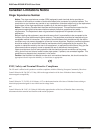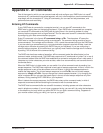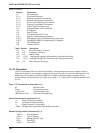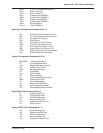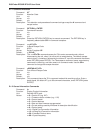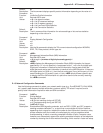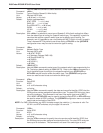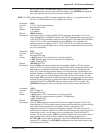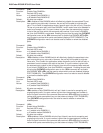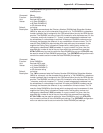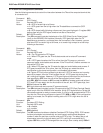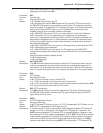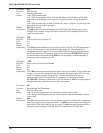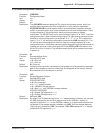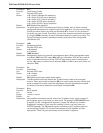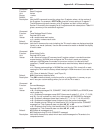
RASFinder RF300E/RF310E User Guide
RF300E/RF310E128
Command: !DNn
Function: Disable Data DN/MSN n
Unit: Decimal ASCII code
Values: n=1 (disable Data DN/MSN 1),
n=2 (disable Data DN/MSN 2)
Default: All ports are enabled
Description: !DNn disables a Data DN/MSN which will effectively disable the associated TA port
from receiving any data calls. However, the port will still be able to originate data
calls. This is useful for applications where a specific port is for dial-out only. Since the
TA has only one serial port, both Data DN/MSN 1 and 2 would have to be disabled in
order to not accept a call. If no port number is given then the assumed port number
is that of the port from which the command was received. If port n had a DN/MSN
set, then that DN/MSN is not erased. Enabling the port later by using the @CONFIG
configuration menu or the !ENn command will re-enable that DN/MSN. AT!L<CR>
may be used to review which ports are disabled (displays PORT DISABLED). The
@CONFIG configuration menu can also be used to disable or review the disabled
ports.
Command: *!DNn
Function: Disable Voice DN/MSN n
Unit: Decimal ASCII code
Values: n=1 (disable Voice DN/MSN 1)
n=2 (disable voice DN/MSN 2)
Default: All ports are enabled
Description: *!DNn disables a Voice DN/MSN which will effectively disable the associated voice
port from receiving any voice calls. However, the port will still be able to originate
voice calls. This is useful for applications where a specific port is for dial-out only or
one doesn’t want to accept voice calls at that time. If no port number is given then
the assumed port number is that of the port from which the command was received.
If port n had a DN/MSN set, then that DN/MSN is not erased. Enabling the port later
by using the @CONFIG configuration menu or the *!ENn command will re-enable
that DN/MSN. AT!L<CR> may be used to review which ports are disabled (displays
PORT DISABLED). The @CONFIG configuration menu can also be used to disable
or review the disabled ports.
Command: !ENn
Function: Enable Data DN/MSN n
Unit: Decimal ASCII code
Values: n=1 (enable Data DN/MSN 1),
n=2 (enable Data DN/MSN 2)
Default: All ports are enabled
Description: !ENn enables a Data DN/MSN which will put it back in service for accepting and
originating data calls. If no port number is given then the assumed port number is
that of the port from which the command was received. AT!L<CR> may be used to
review which ports are enabled (any port that does not display PORT DISABLED).
The @CONFIG configuration menu can also be used to enable or review the
disabled ports.
Command: *!ENn
Function: Enable Voice DN/MSN n
Unit: Decimal ASCII code
Values: n=1 (enable voice DN/MSN 1)
n=2 (enable modem DN/MSN 2)
Default: All ports are enabled
Description: *!ENn enables a Voice DN/MSN which will put it back in service for accepting and
originating voice calls. If no port number is given then the assumed port number is
that of the port from which the command was received. AT!L<CR> may be used to
review which ports are enabled (any port that does not display PORT DISABLED).



